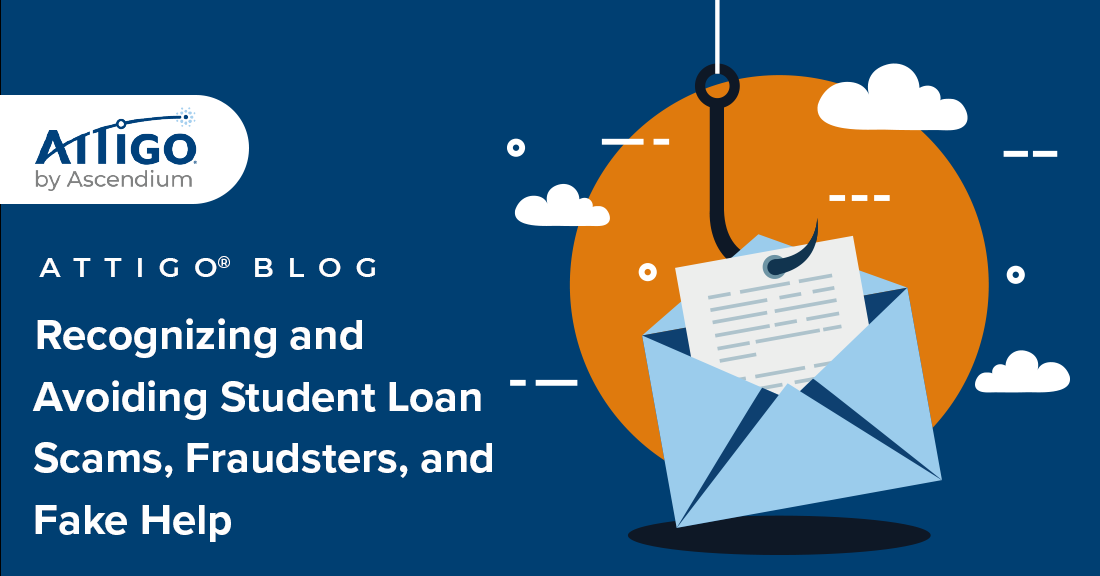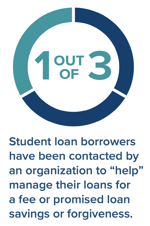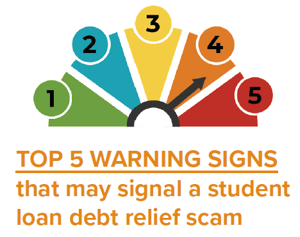Recognizing and Avoiding Student Loan Scams, Fraudsters, and Fake Help

Many borrowers have likely seen ads or received calls or texts from companies promising to help with student loan debt. No matter what pitch these companies make, know this: there is nothing these companies can do for student loan borrowers they can’t do for free for themselves.
This summer we were introduced to Jordan, a 2018 graduate of the University of Wisconsin – Madison, who's well on her way to her dream career in Human Resources. Like many students, Jordan borrowed student loans to help pay for her education. She knows who her student loan servicer is and has been making payments since 2018. Jordan considers herself a savvy person, staying on top of her finances and financial relationships. So, in hindsight the story she shares is surprising and at the same time concerning because it demonstrates how easy it is for capable and informed people to be taken advantage of.
You see, Jordan responded to a letter she received in the mail, from a company offering to help her manage her student loan debt, for a fee. A company that also asked her for private identifiable information (PII).
While there’s nothing wrong with a business seeking to simplify a challenging environment, if the business adds confusion and unnecessary cost, then consumers should be cautious and ask enough questions to fully understand whether the service is right for them.

Jordan S.
Jordan shared, “I had received a couple of letters related to my student loans but didn’t really pay attention until I got one titled, “FINAL NOTICE.” I felt like I needed to respond right away. The opening statement was enticing by saying I could have lower loan rates and save a lot of money. It also had a Benefit ID# at the top of the letter and mentioned a government website where I would create a new student FSA ID. It provided me with contact information for the Student Loan Assistance Department. I stopped reading there and decided to call right away to see if I could qualify for any type of loan assistance because it seemed legitimate."
"I made my first mistake in failing to read the small print at the end of the letter stating they are not affiliated with the government and they are private, third party program." After calling the number in the letter and sharing some information with the operator, Jordan's boyfriend overheard her and told her to not provide any more information and to hang up.
"My boyfriend's mom works in the higher-ed industry so he knew to be cautious when giving personal information away like this," Jordan said. They shared the letter with her boyfriend's mom who advised that the letter was not from Jordan's student loan servicer, the U.S. Department of Education, nor from her school's repayment support partner. Therefore, Jordan reevaluated the solicitation and decided to ignore it.
If she wants to research consolidation as an option, she will call her loan servicer or school approved repayment support partner to seek trustworthy insight.
 Jordan goes on to say, “When signing up for my loans, it would have been beneficial to know I would never be charged additional money to consolidate or reduce my loan payments. Also, to know there are companies like this one out there.”
Jordan goes on to say, “When signing up for my loans, it would have been beneficial to know I would never be charged additional money to consolidate or reduce my loan payments. Also, to know there are companies like this one out there.”
You can help your students, customers, or employees learn more about their student loans and realize this important lesson: no one should care or know more about their money than they do.

Seeking advice is encouraged, even essential, for students desiring to master their personal finances. Trust is something else. Trust can be dangerous, especially if the person or company doesn’t have your student loan borrowers' best interests at heart.



